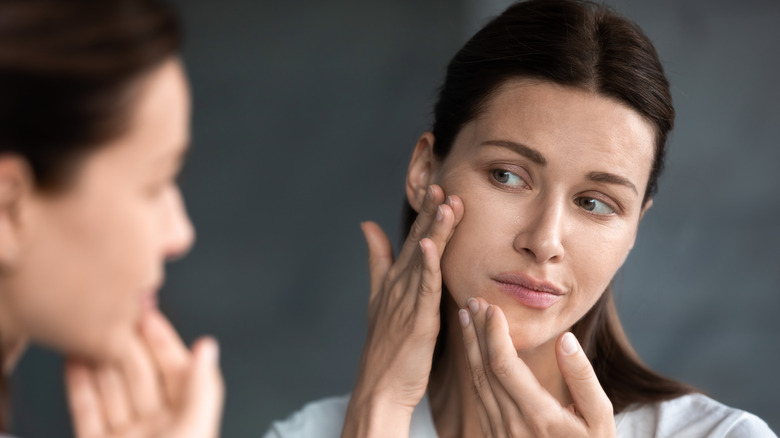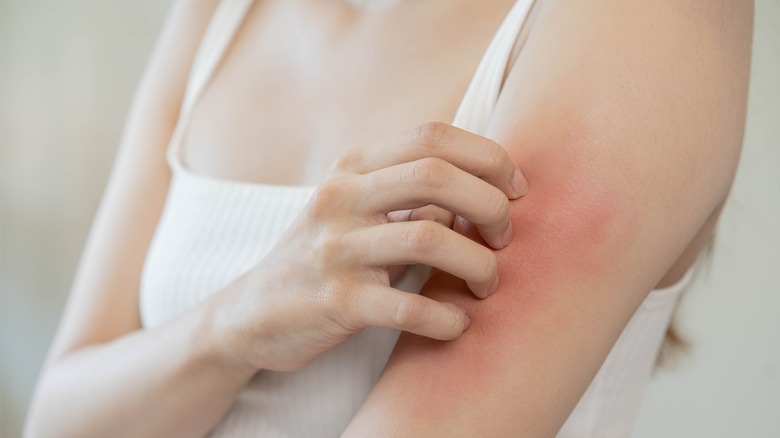What A Broken Moisture Barrier Really Looks Like (And How To Fix It)
"Moisture barrier" has become a buzzword in the beauty industry, predominantly thanks to TikTok. Users have flooded the app with tips on what a broken moisture barrier looks and feels like and which products can provide a quick fix for the problem. These videos have garnered tens of millions of views on the app, but like many TikTok beauty trends that can ruin your skin, the advice is often contradictory and not always fact-based.
The moisture barrier is a real thing, so that part is accurate. The biological term for it is stratum corneum, but it's commonly called the acid mantle, per Soyier Skin. It's the outermost layer of the skin, which is responsible for moisture retention and protection from external damage from pollutants, allergens, and bacteria (via the Cleveland Clinic) Think of it as an X-ray for your skin that screens everything before it goes through.
When she spoke to Hypebae, Victoria Evans, education manager at Dermalogica, stressed the importance of maintaining a healthy and strong skin barrier by warning that, "A compromised skin barrier leads to moisture loss, pH change, imbalance of the microbiome and invasion of irritants." Fortunately, the moisture barrier is also a visible layer of the skin, so you can easily tell when it's damaged and take the necessary measures to repair it.
A broken moisture barrier looks different for everybody
A broken moisture barrier will cry for your help through your skin in several different ways. Dr. Jeanne Eyde, a board-certified plastic surgeon, shared the tell-tale signs of a broken moisture barrier during a chat with Skincare.com, noting they "include increased sensitivity such as itching, redness, irritation, breakouts, dryness, tightness, rashes, and broken capillaries."
Dr. Ashwini Soni, an oculoplastic surgeon and aesthetic doctor, informed Women's Health that dry skin conditions like eczema, dermatitis, or rosacea, could also indicate skin barrier damage because a broken skin barrier cannot function as a protector, nor as a moisture retainer. To fix a damaged moisture barrier, you need to know what's causing it so you can stop and prevent future issues. One of the most common causes of a damaged moisture barrier is the overuse of harsh exfoliating products that grind away essential nutrients and oils while ridding your skin of pollutants and irritants.
Dermatologist Dr. Geetika Mittal Gupta strongly cautioned Vogue India against using certain formulations to achieve a healthy skin barrier: "Skincare formulas containing drying alcohol, synthetic fragrance or harsh chemicals can really damage your skin and strip it of its nutrients." Excessive sun or wind exposure and not moisturizing enough are also major contributing factors to moisture barrier damage, per Allure.
Tailor your skincare routine to fix your moisture barrier
It's important to be mindful of all the different kinds of skincare products when dealing with a damaged moisture barrier. There is a plethora of skin barrier-enforcing products on the market, but a few key ingredients make all the difference. Dermatologist Dr. Sonia Khorana suggests, "Look[ing] for products with ceramides (the good fatty acids that make up your skin), glycerin (a humectant, so it holds moisture), and niacinamide." (via Hypebae).
Swap out your regular cleanser for a gentle and more hydrating option that's abundant in the ingredients mentioned above, and pair that with a gentle moisturizer and daily sunscreen application to get the best results, per Today. Steer clear of exfoliation for up to three weeks after you've discovered skin barrier damage, as Dr. Chris Tomassian, MD, a board-certified dermatologist recommended to Cosmopolitan. Also, try to use products that are as close to your skin's natural pH levels as possible.
A good face oil seals the deal and retains the all-important moisture too. Byrdie advises using a nourishing face oil at the end of your skincare routine to provide extra hydration and to seal in all the replenishing goodness from the other products. It's also equally important to stay hydrated because your moisture barrier requires water for protection, according to MarthaStewart.com.


